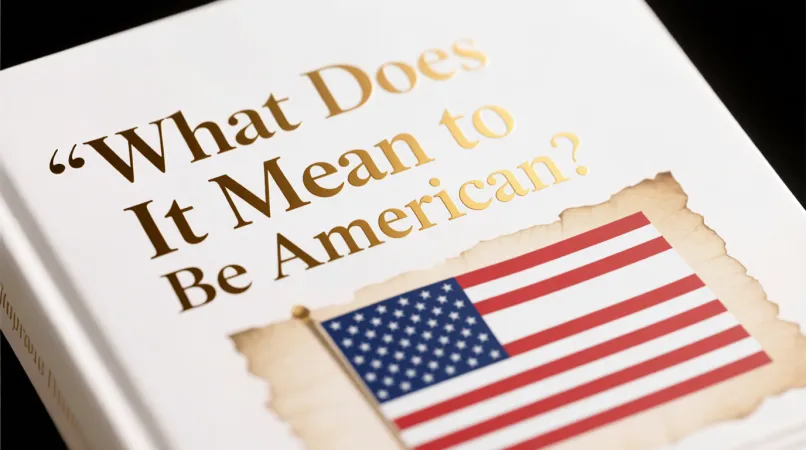Ever come across the phrase “being American” online and wondered what it really means? I remember scrolling through a debate thread where people were arguing about it like it was a Marvel vs. DC showdown.
One person said it’s all about freedom, another said it’s about culture, someone else said it’s the passport—honestly, I just sat there like, “Okay, but what’s the actual meaning?” 😅
So let’s break it down simply.
Quick Answer: To be American means belonging to the United States through citizenship, identity, values, or cultural connection. It reflects ideas like freedom, diversity, individuality, opportunity, and sometimes even shared pop culture.
🧠 What Does “Being American” Mean in Text?
When someone asks “What does it mean to be American?” they’re usually talking about identity, values, and belonging rather than slang or abbreviation.
Here’s the simple version:
To be American = To be a person who identifies with the United States through citizenship, culture, or shared values.
People often use the phrase to talk about:
- Freedom of choice
- Equality and rights
- Diversity of cultures
- The “American Dream”
- Patriotism or national identity
Example Sentence:
“Being American means believing everyone should have a fair shot, no matter where they come from.”
In short: Being American = identity + values + belonging.
📱 Where Is “Being American” Commonly Used?
You’ll see this phrase in places where identity, culture, or national perspective is being discussed:
- 🇺🇸 Social media debates (Instagram, TikTok, X/Twitter)
- 📝 School essays or assignments
- 🗣️ Political or cultural discussions
- 🎙️ Speeches & interviews
- 💬 Casual conversations about nationality
Tone:
- Mostly serious or thoughtful,
- Sometimes prideful or patriotic,
- Casual online discussions may be funny or sarcastic.
It’s definitely not slang — more of a cultural or identity phrase.
💬 Examples of “Being American” in Conversation
Here are realistic, easy examples:
1.
A: what does being american even mean?
B: i think it’s about believing in freedom + equal rights for everyone 🇺🇸
2.
A: is being american only about citizenship?
B: nah, culture + values matter too
3.
A: i love how america is so diverse
B: yeah that’s a huge part of being american
4.
A: does being american mean loving fast food? 😂
B: lol not required but kinda relatable 🍔
5.
A: what does being american mean to you?
B: opportunity + choices + accepting differences
6.
A: can you be american culturally but not born there?
B: yup! happens all the time
7.
A: feel like everyone has a diff definition
B: that’s actually the most american thing ever 😄
🕓 When to Use and When NOT to Use “Being American”
✅ When to Use
- Talking about culture or identity
- School projects or essays
- Social media discussions
- Debates about values, diversity, or freedom
- Explaining national identity
❌ When NOT to Use
- Formal business emails
- Medical or legal contexts
- Casual chats where nationality isn’t relevant
- When referring to someone incorrectly (avoid assumptions)
- Sensitive conversations about race, immigration, or politics unless handled carefully
Comparison Table
| Context | Example Phrase | Why It Works |
|---|---|---|
| Cultural Chat | “Being American means embracing diversity.” | Thoughtful & respectful |
| Friend Conversation | “idk, to me being american feels like having choices.” | Casual + personal |
| School Essay | “Being American represents freedom, opportunity, and equality.” | Formal & clear |
| Social Media Post | “Being American is different for everyone 🇺🇸” | Inclusive + concise |
| Debate/Discussion | “Identity is complex—being American isn’t one single thing.” | Neutral & respectful |
🔄 Similar Words or Alternatives
| Phrase | Meaning | When to Use |
|---|---|---|
| American Identity | The cultural, social, or political traits linked to the U.S. | Essays, discussions |
| Citizenship | Legal belonging to a country | Formal/legal context |
| American Culture | Shared habits, traditions, behaviors in the U.S. | Cultural topics |
| Nationality | Legal nationality status | Forms & official talk |
| The American Dream | The idea of opportunity & success based on effort | Motivational or cultural talk |
| Patriotism | Pride in one’s country | Contexts about loyalty or pride |
❓ FAQs About “Being American”
1. Does being American only mean having U.S. citizenship?
No. While citizenship is one definition, many use the term to describe values, culture, and identity.
2. Can someone be American culturally but not ethnically?
Yes! American identity is based on shared culture, not a single ethnicity.
3. Is being American tied to a specific religion or background?
No. The U.S. is diverse, with no single required background.
4. What values are usually associated with being American?
Freedom, equality, independence, ambition, and diversity.
5. Can immigrants call themselves American?
Absolutely — many Americans are immigrants or children of immigrants.
6. Is the “American Dream” still part of being American?
For many, yes. It’s still a big cultural belief.
🏁 Conclusion
Being American isn’t just about a passport — it’s about identity, values, and belonging to a culture shaped by diversity and freedom.
For some, it’s a legal status; for others, it’s a feeling, a dream, or a shared set of ideals. That’s what makes the phrase so meaningful and personal.
No two people define it exactly the same way, and that’s part of what being American is — individuality, choice, and openness.

Mark Twain, born Samuel Langhorne Clemens, is one of America’s most beloved humorists and authors, famed for classics like The Adventures of Tom Sawyer and Adventures of Huckleberry Finn. Renowned for his wit, satire, and keen observations of human nature, Twain’s writing continues to entertain readers of all ages. On jokesplanets.com, we celebrate Twain’s timeless humor and explore how his clever storytelling inspires modern jokes, puns, and laugh-out-loud content.


